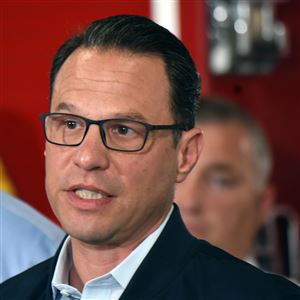Their aim was the same: to get the American public, and the world, to accept natural gas as good and necessary. A savior, even.
Approaches diverged between the gregarious CEO of EQT Corp, Toby Rice, and Nick DeIuliis, the soft-spoken head of CNX Resources, who began his talk at Hart Energy’s DUG East conference on Tuesday with a disclaimer: “I’m shy. I’m an introvert. I usually avoid big events like this one.”
He hid it well.
Mr. DeIuliis, who spoke from the podium at the David L. Lawrence Convention Center as a slideshow of his quotes and tweets cycled on screens behind him, hasn’t been shy about “the left’s campaign to destroy America.” That’s also the subtitle of his upcoming book, “The Precipice,” and a recurring theme on his personal website and his weekly podcast.
He believes that, for various reasons, there are people vilifying the natural gas industry, hyping carbon reductions and rooting for the demise of everyone in the room.
According to Mr. DeIuliis, people who are under attack and don’t even realize it include: the people of Appalachia, specifically small-business owners, the middle class, and those living in poor urban and rural areas; and people in the energy industry — “the real energy industry in natural gas and midstream, not the make-believe energy industry of so-called renewables and subsidy and zero-carbon mythology.”
And those attacking them are companies that profit from efforts to “tackle climate change,” politicians who need to fill holes in budgets, and the zealots who want to eradicate the industry.
And Mr. Rice thought he came with fighting words.
Opening the conference, the CEO of the largest natural gas producer in the country suggested that it’s time to “bring a little bit of an offensive nature to this situation.”
“Oil and gas,” Mr. Rice said, “we don’t get no respect.”
He was referring to a letter he received two weeks ago from Massachusetts Sen. Elizabeth Warren declaring her suspicion that “corporate greed and profiteering” plus exports of liquified natural gas were leaving U.S. utility consumers stranded with higher prices.
She had sent the letter to large oil and gas companies, including EQT, asking questions like: “Has your company considered cutting, suspending, or ending exports of natural gas to help ease spiking domestic prices?”
On Tuesday morning, Downtown-based EQT published its reply, and Mr. Rice gave the conference crowd a live take.
“LNG exports are the biggest greenhouse gas initiative on the planet,” Mr. Rice said. There should be more gas exported, not less.
His rationale is that if natural gas, specifically American gas, can get liquefied, put on boats and shipped to China, India and anywhere else where coal is burned for power, it could displace the biggest source of emissions.
Today, about 10% of total U.S. gas production is sent abroad as liquified natural gas. (EQT exports about 3% of its production to Canada, according to its letter.) The reason it’s not more is because there aren’t enough liquefaction plants and pipelines, although some are in the works.
While the spot price for natural gas in the U.S. is now around $4.50 per million British thermal units, Asian markets are paying $30 for the same amount.
“The key growth engine for natural gas producers is going to be foreign demand,” Mr. Rice said, pursuing an environmental argument.
Over the past 15 years, natural gas has overtaken coal, which releases at least twice as much CO2 when burned, in the U.S. power sector. Based largely on that, power emissions have dropped. Mr. Rice said there’s no reason that can’t be replicated abroad, if only regulators and politicians would make an effort to support building out the infrastructure.
“If allowed to do what we can do, we can satisfy the world,” Mr. Rice said on Tuesday.
While Mr. Rice appealed to the overwhelming global consensus that reducing carbon emissions is a desirable and critical goal, Mr. DeIuliis went in a different direction and proposed a bargain of his own.
He called it “a new social contract” or a “give and get.”
In the give column, Mr. DeIuliis wants to revisit the impact fee imposed by Pennsylvania on new oil and gas wells, although he said details of his plan would be revealed in the coming weeks.
He also said the industry should develop rigor in its environmental reporting; hire locally, from the building trades, and from underprivileged urban and rural areas; and take a “proactive leading stance on plugging the thousands of leaking wells in our region.”
In return, Mr. DeIuliis would want an acknowledgement that no energy source is without a carbon footprint; support for pipelines, gas, and petrochemicals; advocacy from industry and political leaders “to take on those shrill voices in places like New York and Massachusetts,” and the elimination of protected markets and subsidies for wind and solar.
“No gets, then no gives,” Mr. DeIuliis said.
Anya Litvak: alitvak@post-gazette.com
First Published: December 8, 2021, 3:48 p.m.

















